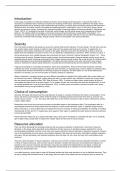Introduction
In this essay, the patterns of interaction between economics and sociology will be discussed. To discuss this matter, it is
necessary to understand wat is meant by economics and sociology in this essay. Economics is defined as “the study of how
people and society end up choosing, with or without the use of money, to employ scarce productive resources that could have
alternative uses, to produce various commodities and distribute them for consumption, now or in the future, among various
persons and groups in society. It analyzes the costs and benefits of improving patterns of resource allocation” (Samuelson and
Temin, 1976, p. 3). Sociology is the study of social life, social change, and the social causes and consequences of human
behavior. The subject matter of sociology is very broad, because all human behavior is social (What is Sociology?, n.d.).
Economics is a social study and has therefore a lot of reciprocities with sociology. With this in mind, we will be discussing how
economics is interacted with sociology, through scarcity, choice of consumption, and resource allocation.
Scarcity
First, this essay will start by discussing how economic scarcity influences the behavior of human beings. This will show how and
why society makes certain choices in relation to each other and how people react and act on scarcity. To explain this, it is
necessary to know what is understood as ‘scarcity’ in this paper. Scarcity occurs when the demand for a good or service is
greater than the availability of a good or service. This is a significant understanding in economics. When a product is scarce, it
can be perceived as more valuable because less consumers can have it (Scarcity | National Geographic Society, n.d.). There
are three types of scarcity: Demand-induced, supply-induced, and structural scarcity. Demand-induced scarcity occurs due to
population growth and/or increasing consumption levels. Supply-induced scarcity is when the overall amount of a limited natural
resource decreases due environmental degradation. And lastly, structural scarcity occurs when consumers have unequal
access or restrictions to certain natural resources in a society (Environmental Scarcity and the Outbreak of Conflict, 2001).
A big part of sociology is social status and jealousy, these work cooperatively. There are three kinds of statuses, ascribed,
achieved and mixed. An ascribed status is a status that came with birth, for example being a child or sibling. An achieved status,
is a status which someone has worked for, like being a spouse or employee. The third status, is a mix of the achieved and
ascribed. For example, you can have the status of a parent, planned or unplanned.
Status is important in sociology because we have different expectations of people with a higher status than a lower status, we
act towards one’s status. People with a higher status are seen in a more positive way. Opposed to people with a lower status,
who are viewed more negatively (Blau 1964, Elias & Scotson 1965). To achieve a higher status, people acquire all kinds of
commodities and titles to use as a status symbol. To be a status symbol, the commodity must have two characteristics: It must
be socially desirable and it must be scarce (Blumberg, 1974). A certain scarce commodity or service can better one’s status,
and therefore the way they get treated by society.
Choice of consumption
Secondly, this essay will discuss how the social behavior of people in a society will influence the choice of consumption. In this
essay, with choice of consumption will be meant the range of competing products and services from which a consumer can
choose (Just a moment. . ., n.d.). This essay will mainly focus on the choices consumers make in stores, influenced by society,
to gain a higher status.
Researchers have found that consumers purchase commodities based on the bandwagon effect. The bandwagon effect is a
psychological phenomenon where people have the tendency to adopt certain behaviors, styles, or attitudes simply because
others are doing so. A study of Boto-García en Baños-Pino found an increase of individual probabilities of travelling or travelling
internationally of 9.9% and 27.1% respectively, when people in their region or neighborhood were aiming to travel and planning
to travel abroad (2022).
People with lower status look up to people with higher status, they want to be related or connected with them. So to, hopefully,
gain a higher status, people listen to people with a higher status and thus buy the same products.
Resource allocation
Third, we will be discussing how sociology influences the way resource allocation is determined in economics. Resource
allocation, in this essay, will be described as the distribution of finite resources to specified purposes selected from among
several feasible possibilities. Scarcity is one of the main reasons that good resource allocation is important, because it concerns
one of the fundamental economic issues, the imbalance between finite resources and buyers’ potentially boundless necessities
and wants. We are discussing a few important questions about this topic, for who, what, and how much commodities will be
produced.
There are mainly two types of resource allocation, continuous and one-time. Continues resource allocation demands a constant
in inflow of required resources, while one-time resource allocation insulates that resources are allocated and employed in a
process for only one time. Financial and information resources are needed and implemented on the regular, so these are
categorized as continuous resource allocation. Equipment and technology is an example of one-time resource allocation,
because it is implemented once.
In a market economy, society plays a huge roll. Because families and firms make decisions on how to distribute resources. They
do this by making their demands known, so the supply side can react to their wishes and can change the price or amount of





